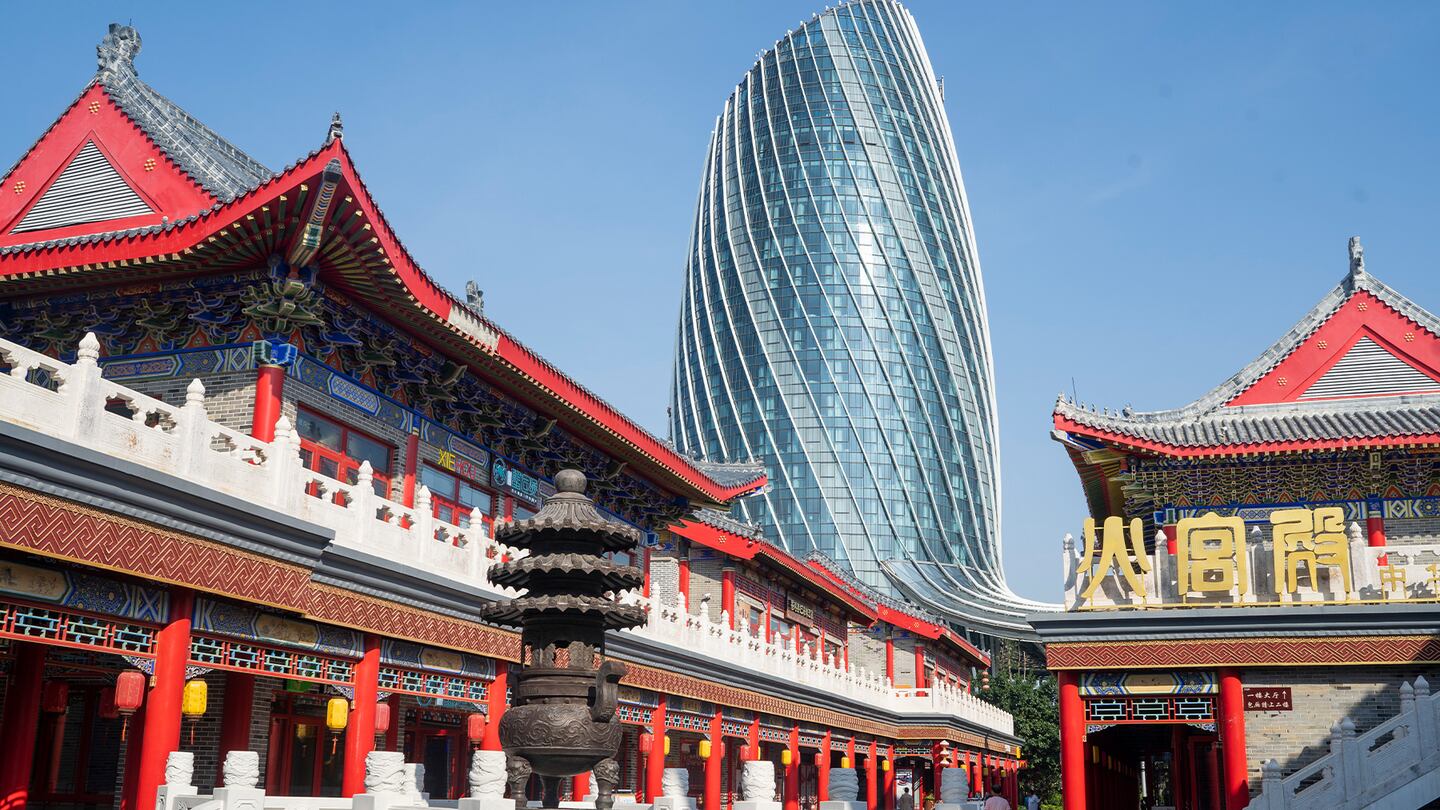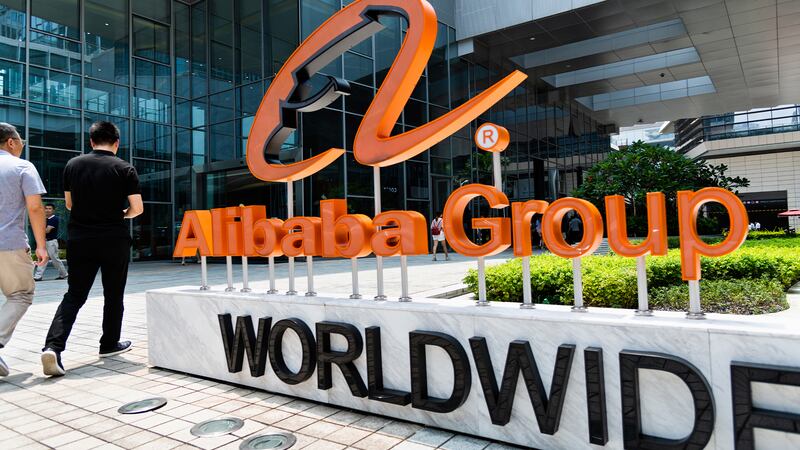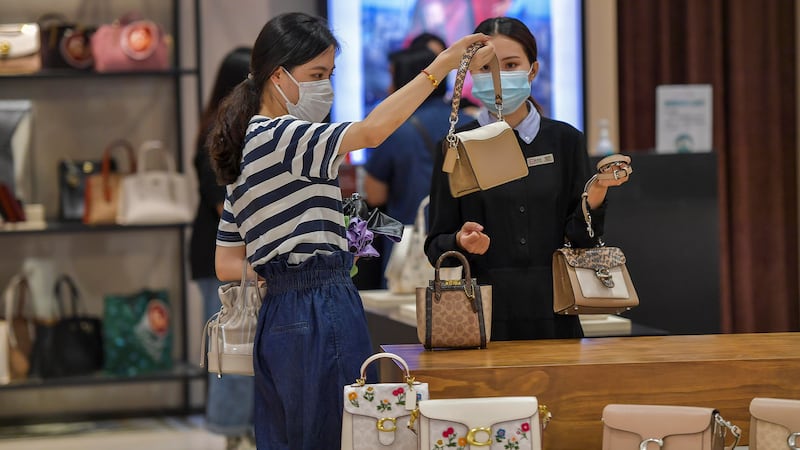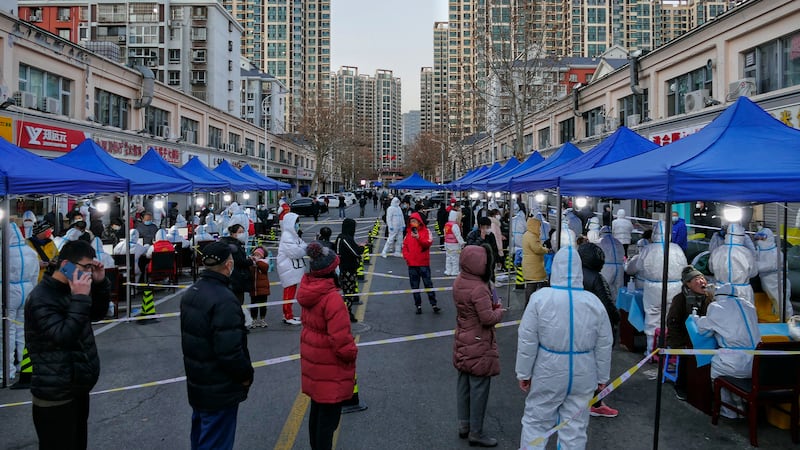
The Business of Fashion
Agenda-setting intelligence, analysis and advice for the global fashion community.

Agenda-setting intelligence, analysis and advice for the global fashion community.

The new year has brought no relief in the bad news that has plagued China Evergrande Group for the past six months. The property developer is now famous far beyond Chinese borders as the world’s most indebted with around $300 billion in liabilities as of summer 2021.
Last week, Evergrande temporarily halted trading on the Hong Kong stock exchange and then revealed it had been ordered to demolish 39 buildings on a development off the coast of Hainan Island called “Ocean Flower Island.” The firm’s share price took a beating as it battled to stave off wave after wave of payment deadlines in the second half of 2021, eventually losing 89 percent of its value over the course of last year.
In better days, Ocean Flower Island was feted in local media as China’s answer to Dubai’s Palm Jumeirah, and though Evergrande said in regulatory filings it was ploughing ahead with the project, the increased scrutiny it faces in the current climate is a complete turnaround from the cosy deals and shortcuts it has been able to take in years past.
Life for Evergrande and other major property developers caught up in the Chinese government’s ongoing effort to rein in the excessive debt these firms had come to rely on is unlikely to get any easier in 2022. But despite media reports raising valid concerns about the potential for a spectacular implosion of Evergrande’s business — an outcome that would risk spilling over into China’s wider economy — that hasn’t come to pass. Not yet, anyway.
ADVERTISEMENT
Now, more and more observers seem convinced that the firm, still teetering on the brink as it careers from missed international bond payments to downgrades by major ratings agencies, will be subject to a massive, long-term, state-managed restructuring behind the scenes, rather than a widely publicised bail-out or an all-out collapse.
“It’s pretty clear that the state is seriously involved in managing the situation,” Shehzad Qazi, managing director of data analytics firm China Beige Book, told AFP last month. The result will “ultimately be a ‘controlled demolition’,” he added.
But even in such a best case scenario, there could be an impact on consumer sentiment and spending in China, particularly when it comes to non-essential categories like fashion and luxury goods.
The Link to China’s Middle-Class Consumers
As China’s second-largest property firm, Evergrande long rode a seemingly unstoppable boom in real estate prices, driven jointly by the country’s growing middle class and a mass urbanisation process, which saw local governments around the country make an average of 30 percent of their revenues from land sales to property groups like Evergrande in 2020, according to figures from China’s finance ministry.
But it wasn’t only huge property developers and local governments filling their coffers with the proceeds of China’s real estate boom; ordinary Chinese citizens were also beneficiaries.
A huge share of China’s household wealth, 70 percent according to investment management firm Loomis Sayles, is invested in real estate, roughly double the 35 percent share seen in the US.
Even during the boom times, there were warnings that the breakneck borrowing and immense piles of debt fuelling China’s property market would eventually cause trouble. As far back as 2018, China’s central bank name-checked Evergrande as one of the conglomerates on its watch that could cause systemic risk to China’s economy.
ADVERTISEMENT
Though mainstream analysts say the comparison is problematic for a host of reasons, there are some who worry that further volatility in China’s property market could even act as a contagion to destabilise the world economy. They see parallels with the lead-up to the Great Recession about 15 years ago, just before the global financial crisis was sparked by the bursting of the US housing bubble.
The collapse of Evergrande could indeed impact China’s banking system (the firm is said to owe money to more than 170 local banks), and lead to the failure of the many companies it subcontracts for its projects, leaving small businesses, and newly-minted middle class investors who have bought off-the-plan properties that may or may not be built, in financial hardship.
Some people will be more wary about spending, especially in the middle class.
To a significant extent, the continued success of many international fashion and luxury brands in China hinges on the continued prosperity — and confidence — of this middle class cohort who are prone to invest in property. According to McKinsey & Company, consumers in the upper-middle income brackets are likely to drive “the lion’s share of growth in China over the next decade.”
Putting the case of Evergrande to one side, it’s apparent that the broader housing market is in worse shape than it has been in years.
Data from Morgan Stanley shows that contracted sales for 24 major property developers in China fell 31 percent in December from a year earlier. This follows a fall in new home prices of 0.3 percent month-on-month in November, the biggest decline since February 2015, according to Reuters estimates. And in its latest outlook, Fitch Ratings predicts a decline of 3 percent to 5 percent in mainland China’s home prices in both 2022 and 2023.
A Potential Dent in Discretionary Spending
This decline is likely to dent discretionary spending among some consumers, says Camille Gaujacq, an analyst at Daxue Consulting, a Shanghai-based market research firm.
“Some people will be more wary about spending, especially in the middle class because they feel as though their savings are not as safe as they used to be before the crisis,” he said.
ADVERTISEMENT
The downturn in the property sector, combined with the impact of China’s ongoing “zero tolerance” policy for controlling Covid-19, has led Goldman Sachs analysts to project China’s real household consumption in 2022 will remain “below its pre-Covid trend”, even with an estimated 7 percent year-on-year growth.
In addition to the property slump, the investment bank also pointed to the country’s new “Common Prosperity” policy in November when cutting its 2022 growth forecast for the global luxury goods market from 13.5 percent to 9 percent. Goldman Sachs estimates China will see 4.8 percent GDP growth this year, down from an estimated 7.8 percent in 2021.
“In the short-term, there will be a sentiment issue. Some luxury companies are already seeing their growth in the China market slowdown in recent quarters; it’s growing but it’s not that great compared to the previous quarters,” explained Jonathan Yan, a Shanghai-based principal of consultancy Roland Berger.
Yan is less pessimistic, however, about China’s long-term growth prospects for the fashion and luxury markets.
“It’s still just a hiccup, [these markets] will continue growing,” he added.
How Can a Property Crisis Be Averted?
Whether the current property slump turns into a full-blown crisis will depend on moves made by the central government over the coming year to help support the market.
There are already talks that a long-mooted property tax, which gained momentum in the wake of Chinese President Xi Jinping’s speeches relating to “Common Prosperity” might be shelved for the time being.
Even though real estate investment and China’s historically low property taxes have helped fuel the country’s wealth gap, an expected expansion of the property tax trial already underway in Shanghai and Chongqing will now likely be put on hold in order not to spread further panic among homeowners across China.
“It may be a better time to launch the property tax trials when the market is calm,” Bloomberg Intelligence analysts Kristy Hung and Lisa Zhou were quoted as saying last week.
Meanwhile, the words and signals emanating from Beijing in recent months have put “stability” at the forefront, indicating top policymakers in China are just as concerned about a sustained slowdown in its economy as the global brands that have increasingly come to rely on a robust China for their success.
Looking on the Bright Side
As China has grown to become the world’s largest fashion and luxury market, accounting for a third of European luxury goods makers’ sales in 2019 and 28 percent in 2020, according to UBS analysts, it’s only natural for anything that potentially puts the Chinese economy at risk — like a property market crisis — to rattle nerves in brands’ Paris and Milan headquarters.
This said, China is a very big place and the drivers of fashion and luxury demand are multifaceted.
Roland Berger’s Yan points out that Gen-Z and Millennial shoppers in China — a major driver of fashion and luxury sales here — are less likely to be homeowners or prospective home buyers, with many relying on their parents to provide an apartment for them.
“These people really enjoy life and tend to buy luxury stuff. They enjoy their lifestyles and I don’t see anything that is going to trigger them to change that attitude,” he said.
There is also the pandemic to consider. Though China’s continued efforts to stamp out community transmission in Covid-19 has caused concern about the impact of its strict policy on economic growth, people’s incomes, unemployment and mobility within the country, it also means Chinese consumers will likely remain in China for at least another year.
We suspect that there’s a generational shift in taste towards investment in alternative asset classes.
The repatriation of luxury spending which has been a major driver of growth in China in 2020 and 2021, therefore, also remains in play. With an added boost perhaps from consumers re-routing discretionary income that might have been spent on international and domestic travel, dining out and other service-based experiences, to luxury goods.
According to The State of Fashion 2022, a report co-published last month by The Business of Fashion and McKinsey & Company, China’s domestic luxury market reached sales 70 to 90 percent above 2019 levels by the end of 2021, with a further 20 percent year-on-year growth tipped for 2022 to reach 90 to 110 percent above 2019 levels.
“It’s difficult to say how much of an impact the real estate crisis will have on luxury goods, but if we look at the current trends, I don’t think it will completely nullify the positive trends of the luxury market in China because there is a lot of momentum behind that reshoring of luxury spending,” Gaujacq said.
Could Some Categories Benefit?
There is also the consideration of certain luxury categories disproportionately benefitting from a diversification of investment away from real estate. Luxury watches, for example, have been touted as a category that could see more interest as the real estate market cools.
“We suspect that there’s a generational shift in taste towards investment in alternative asset classes,” said high-end dealer Silas Walton, chief executive and founder of luxury watch platform A Collected Man, about his platform’s growing mainland China consumer base.
“In the rare space, we expect to see a shift in acquisition rationale, rather than volume. Consumers [will] typically gravitate towards investment pieces, which seem safe stores of value, rather than towards impulse purchases,” he added.
Figures from the Federation of the Swiss Watch Industry show that January to July 2021 exports to China rose 63.7 percent over the same period in 2019.
Not everyone is convinced about a link between timepieces and the property market. While acknowledging the demonstrable increase in appetite for luxury watches among Chinese consumers in recent years, Gaujacq maintains that watches as an investment category will remain “relatively niche.”
Even if watches are unlikely to replace the central place real estate holds in the collective investment psyche of the Chinese nation, the broader implication of a shift in purchasing behaviour among Chinese consumers which sees luxury goods as products that hold longer-term intrinsic value better than most, bodes well for brands known for their higher resale values.
In the event of a crisis or even further decline in the property market, this means luxury leaders such as Hermès and Chanel, for example, would likely continue to outperform smaller brands with a less proven track record for long-term value.
More broadly, luxury fashion players would be better insulated than those in the mid-market as the former benefit from the relative resilience of the wealthy. Meanwhile, brands operating at the more affordable end of the spectrum may tap into consumers looking to downgrade in the face of financial hardship.
时尚与美容
FASHION & BEAUTY

Year of the Tiger Interpretations Ahead of Chinese New Year
With the year of the tiger beginning on Feb.1, many luxury brands have already released Chinese New Year campaigns. The arrival of the Omicron variant of Covid-19 to the mainland means the holiday is likely to be a muted affair but that hasn’t stopped brands including Dior, Gucci, Balenciaga and Kenzo making liberal use of tiger figures and prints for limited edition collections. Prada’s campaign is an exception, with no overt reference to tigers in the collection itself, but the brand has pledged to donate to big cat protection with its proceeds; the campaign also includes a callout for young artists to submit their own interpretations of the tigers, with the winner to be used as part of a “special project” in 2022. (Press Release)
Bottega Veneta Hosts a Brand Takeover On the Great Wall of China
In other Chinese New Year news, Bottega Veneta staged a takeover on the Great Wall of China from Jan. 6 to Jan. 12. The display showcases not only Bottega Veneta’s name and logo, but also the characters 新春快乐, which means Happy New Year. The installation is done in Bottega Veneta’s signature green as well as a tangerine shade of orange, which the brand chose because it’s a symbol of luck in China. (BoF)
Chinese Beauty Brand Accuses Chanel of Foul Play Over Red Camellia Line
No. 1 de Chanel, a nine-piece line that encompasses skin care, makeup, and fragrance featuring red camellia as a major ingredient, was recently launched to much fanfare worldwide. The French luxury house said it has been researching ingredients since it opened a 98-acre camellia farm in 1998. Sun Laichun, the founder of Lin Qingxuan, a Chinese skin care brand established in 2003 that also specialises in products using the red camellia flower, took to Chinese social media to complain that Chanel has been poaching key members of his staff. Netizen reaction to the accusations was mixed with many coming to Chanel’s defence, pointing out that the international luxury brand hasn’t really acted improperly by offering people competitive working conditions or using a common, unpatented ingredient. (Jing Daily)
科技与创新
TECH & INNOVATION

Chinese Authorities Fine Tencent, Alibaba, Bilibili, JD.com for M&A deals
China’s State Administration for Market Regulation (SAMR) last week announced it has fined Tencent, Alibaba, JD.com, and Bilibili for failing to report 13 merger deals to authorities in advance, a sign that 2022 will bring little reprieve for tech companies in the midst of an ongoing regulatory crackdown. The regulator cited 13 cases dating back to 2015, each carrying a fine of 500,000 yuan ($78,700). Tencent was involved in nine deals and received a total fine of RMB 4.5 million ($710,000). Alibaba was fined for two deals that violated China’s antitrust law by not seeking official approval prior to the mergers, and JD.com and Bilibili were each penalised for one. (KrAsia)
Douyin E-Commerce Sees Domestic Brand Sales Grow 667% Last Year
The Chinese version of TikTok saw Chinese brands increase sales by 667 percent in 2021 on the platform, with a 411 percent growth in local clothing and accessories brands and a 696 percent increase in C-Beauty brand sales, according to a report released by the platform last week. Douyin said the growth was jointly attributable to its policy of promoting homegrown products as well as growing consumer interest in local brands. (By Queennie Yang)
消费与零售
CONSUMER & RETAIL

Hainan’s Duty-Free Sales Exceeded $9.43 Billion in 2021
According to official local government data, duty-free sales on the southern tropical island topped 60.17 billion yuan ($9.43 billion) last year, up 84 percent. The number of shoppers reached 9,676,600, up 73 percent. The surge has been boosted by preferential policies and the disruption of Chinese travel abroad due to the pandemic. Now the popular travel destination aims to sell more than 100 billion yuan ($15.69 billion) of duty-free merchandise in 2022, officials said. (By Queennie Yang)
政治,经济与社会
POLITICS, ECONOMY, SOCIETY

Omicron Emerges Within Striking Distance of Beijing Weeks Out From Olympics
The port city of Tianjin reported 21 new locally confirmed cases of Covid-19 on Monday, after two Omicron cases were found on Saturday, leading to school closures, bans on non-essential travel and a mass testing campaign over the weekend. Tianjin is only 30 minutes by train from Beijing (train services have mostly been suspended in recent days) and also borders Hebei province, which is hosting many of the snow sports during the Winter Olympics, which are due to kick off Feb. 4. (Bloomberg)
Report: Supply Chain Intermediaries Are ‘Laundering’ Banned Cotton from Xinjiang
A study released in December by Sheffield Hallam University’s Helena Kennedy Centre for International Justice found the “laundering” of cotton from Xinjiang has become a widespread practice, with the raw materials exported from China to manufacturers in intermediary countries such as Indonesia, Sri Lanka, Bangladesh, Vietnam, India, Pakistan, Kenya, Ethiopia and Mexico before being sold on to brands that are potentially unaware of the raw material’s provenance. According to the “Laundering Cotton: How Xinjiang Cotton is Obscured in International Supply Chains” report, manufacturers in those countries supply more than 100 global fashion brands, which are “at high risk of having Xinjiang cotton in their supply chains”. (BoF)
Regulators Crack Down on “Boy Love” and Idol Shows
Beijing’s National Radio and Television Administration (NRTA) announced last week that idol talent competition programmes and BL (“Boy Love”) dramas, a genre popular among many in China particularly young women which depicts a chaste strain of homoeroticism between two handsome male co-stars, would be banned. The regulator also said dedicated inspections of online film and television dramas, short videos and livestreaming would soon begin in order to foster a “healthy and clean” internet environment. Last summer, the NRTA also banned “niang pao and other abnormal aesthetics” (”niangpao” is a Chinese term often translated as “sissy”) on television, encouraging broadcasters across the nation to promote traditional Chinese aesthetics instead. (Jing Daily)
China Decoded wants to hear from you. Send tips, suggestions, complaints and compliments to our Shanghai-based Asia Correspondent casey.hall@businessoffashion.com.
With consumers tightening their belts in China, the battle between global fast fashion brands and local high street giants has intensified.
Investors are bracing for a steep slowdown in luxury sales when luxury companies report their first quarter results, reflecting lacklustre Chinese demand.
The French beauty giant’s two latest deals are part of a wider M&A push by global players to capture a larger slice of the China market, targeting buzzy high-end brands that offer products with distinctive Chinese elements.
Post-Covid spend by US tourists in Europe has surged past 2019 levels. Chinese travellers, by contrast, have largely favoured domestic and regional destinations like Hong Kong, Singapore and Japan.